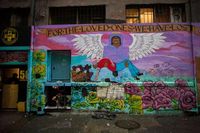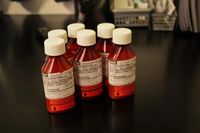I recently took a vacation to visit my parents, after over 12 months of not seeing them in person. A trip to the cottage and small town where we spent many long weekends and summer moments on the beach, at the campfire, in our cozy cottage.
In our socially distanced conversations and catch-ups, when I speak about my work in harm reduction research, translation, and organizing, my dad keeps saying, very proudly — and with big tears in his eyes — “Yes, you’ve done your time in the trenches. It’s time to try something different now.” He’s referring to my time spent as a frontline worker in harm reduction drop-in centres and emergency shelters. I worked throughout the ongoing drug poisoning crisis, experiencing the persistent and unimaginable number of overdose deaths caused by drug policy failures.
Aside from the problematic militarization of harm reduction centred-work in his phrase, what he also doesn’t realize is that I’m still in those “trenches”. I’m still consistently hearing about overdose deaths in my community, and the community I ran away from because it just all became too much for me to face, and too much to hold within me.
There were literally so many deaths I just couldn’t keep count — and I still can’t. So many lives taken, always too soon. And it just doesn’t stop. When will it be “enough”?
When will it be enough deaths to be taken seriously by politicians, and talking-heads? It should have been “enough” a hell of a long time ago.
So many people I know have died — and I’m only 31. Friends, colleagues, old lovers, people who I served and worked with as a frontline worker. Old connections who I still desperately try to find on the internet at 3am in a hopeless attempt to assure myself that they are still alive.
And what my dad really doesn’t understand — and not for lack of trying to — is that I will always be in these “trenches”. It’s just that now, these “trenches” are in my mind, in my heart, and in my soul. These “trenches” are psychological, and they taunt me with bad dreams, flashbacks, intense high sensitivities, and chronic anxiety. All of which I try to cope with by using drugs to escape and numb it all out. These “trenches” have left emotional and mental scars that are so deep I can’t even talk about it with some family members and friends.
I will always feel the heavy weight that sits on my shoulders when a friend or old colleague calls and their first phrase is something like: “I’m so sorry to have to be the one to tell you this…” or “So I’m not sure if you’ve heard or not yet, but…” or “I want you to hear this from me and not through the news or Facebook…”
And of course that all-too-common numb feeling that comes while reading Twitter and Instagram posts from friends and colleagues about the people we have lost and who we profoundly miss.
It’s a strange feeling of disassociation that comes from routinely seeing these posts – it’s a numbness, a feeling of it all being so surreal, so unbelievable, so unfathomable. It all just becomes too much for me to face, and too much to hold within me.
But it’s real, it all really happened, and it’s all still happening. And this will continue unless we end the criminalization of drugs and the criminalization of people who use, share, sell, and cultivate them. This will not stop until we dismantle the disastrous drug policies responsible for the deaths of literally thousands and thousands of people.
We need to act now. Actually, we needed to act YEARS ago. People with living and lived expertise of drug use have been calling for us to act for literally DECADES. When will enough be enough?
Decriminalize now. Provide adequate safe(r) supplies of drugs. Allocate robust funding and support for community-based organizations engaging on-the-ground in communities. Acknowledge, honour, and uplift the grassroots efforts of people who use(d) drugs, sex workers, and other allies who have been long-operating outside the non-profit industrial complex. Commit substantial amounts to drug substitution programs and treatment services that offer holistic, person-centred services that emphasize freedom, choice, and self-determination. Fund public housing and education programs. Initiate anti-drug stigmatization campaigns nationally and within communities.
Until we undertake these not-even-that-radical acts of love and compassion, we will always all be “in the trenches”.




